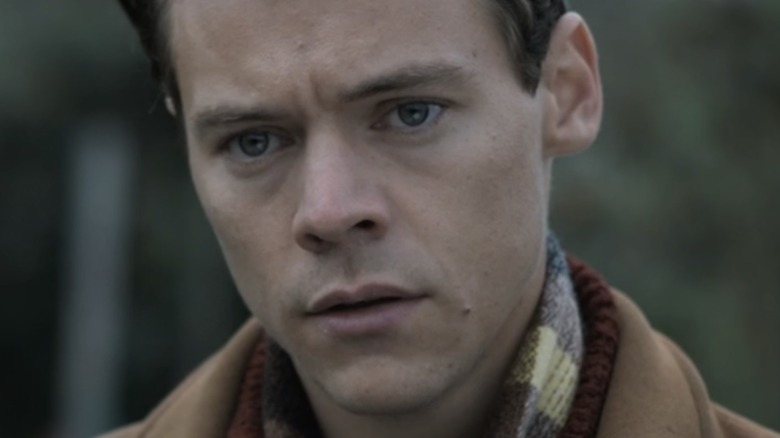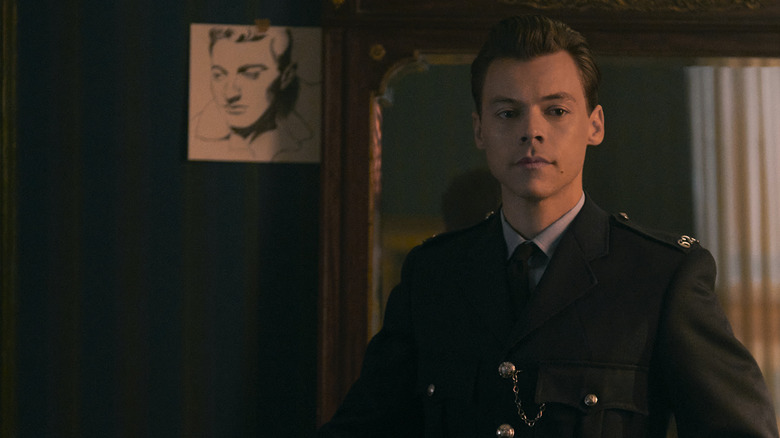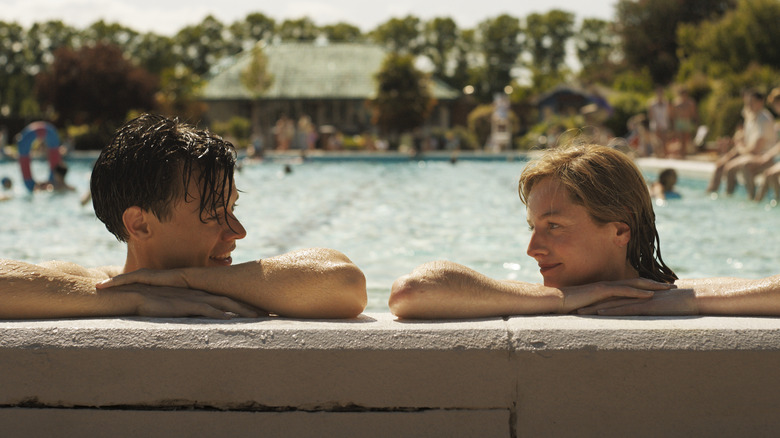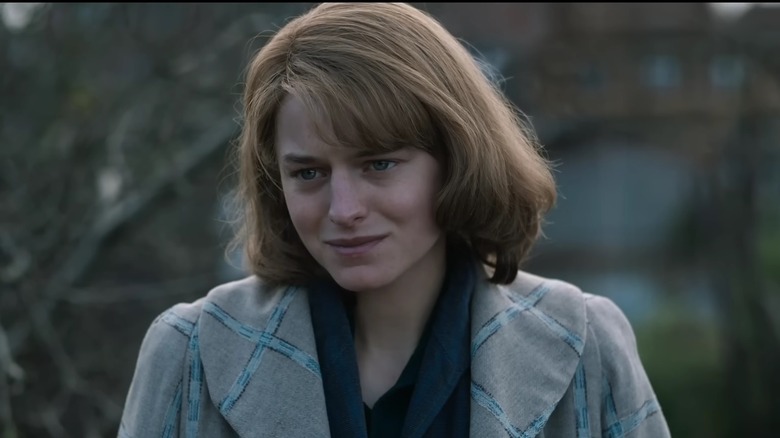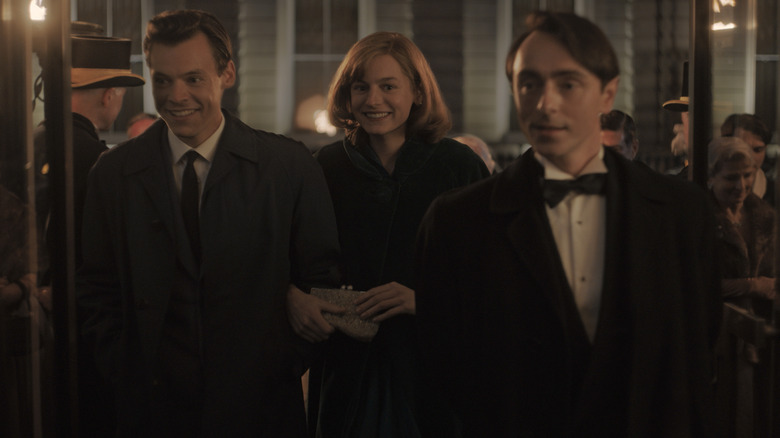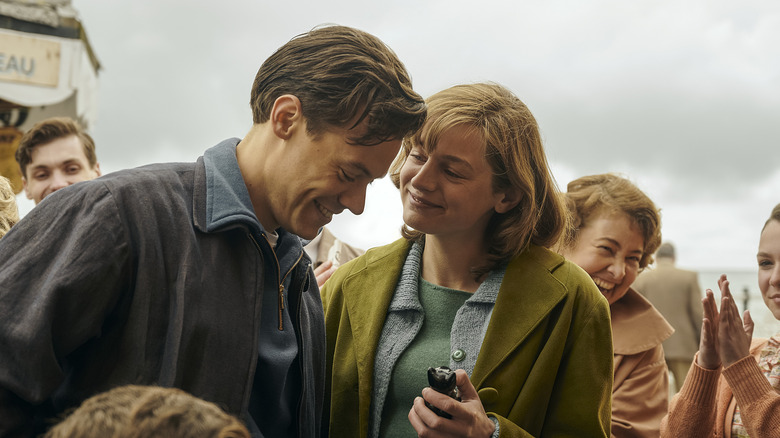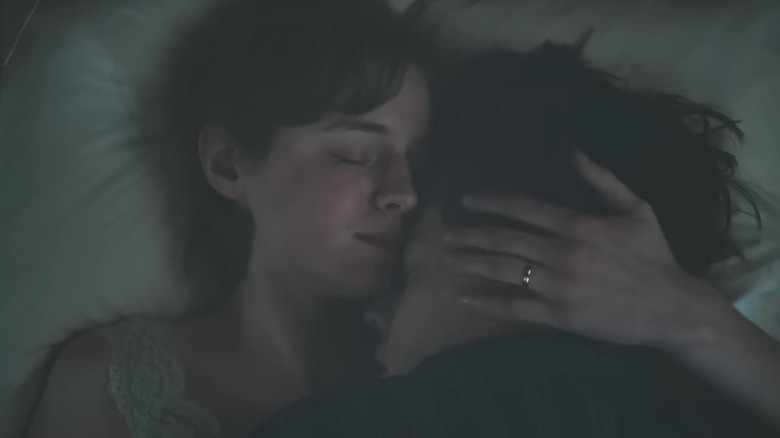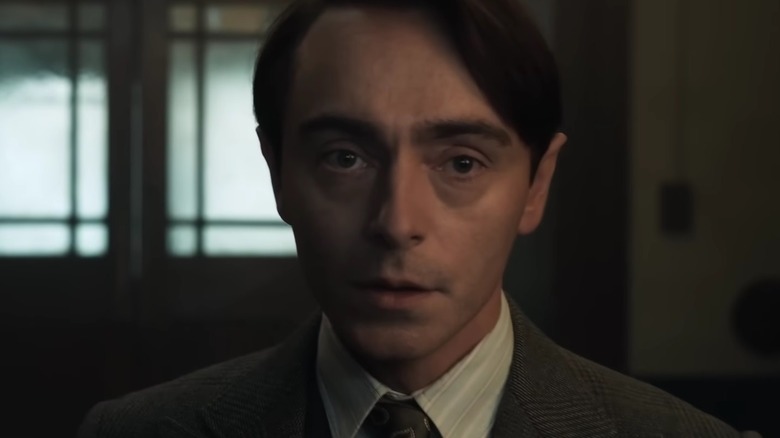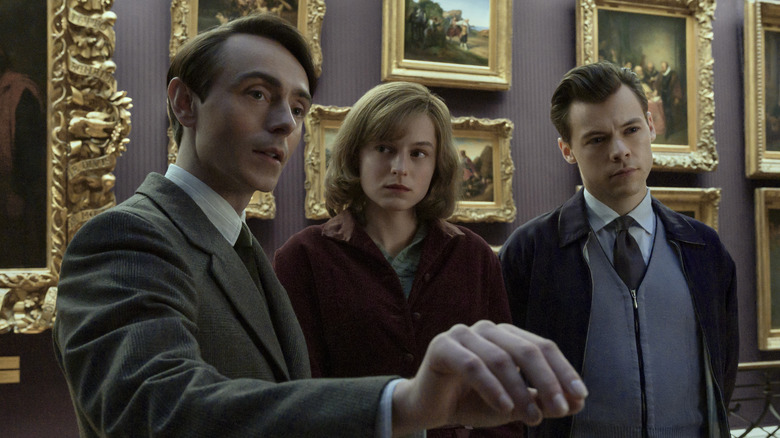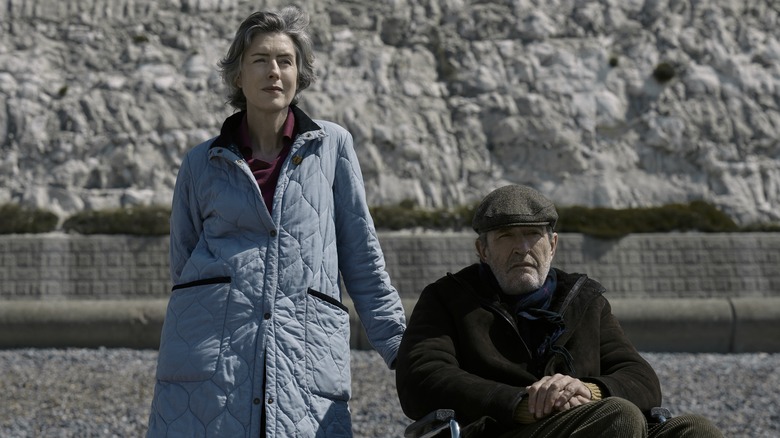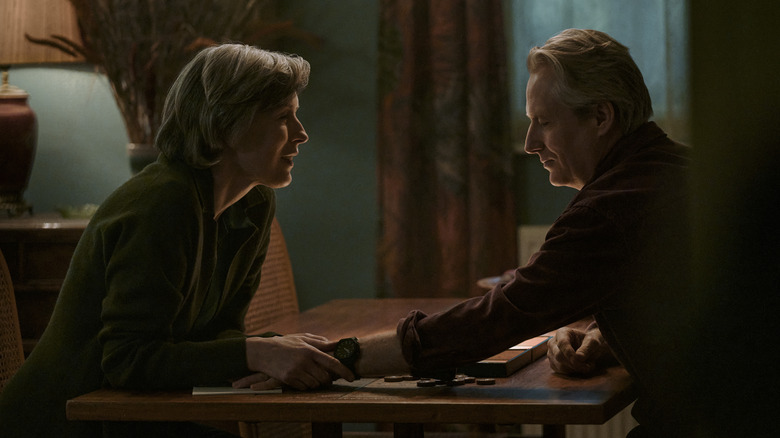My Policeman Moments That Really Upset Us The Most
Directed by Michael Grandage, "My Policeman" is a recently released romantic drama starring Harry Styles, Emma Corrin ("The Crown") and David Dawson ("Peaky Blinders"). Based on the book of the same name by Bethan Roberts, the film follows Styles as PC Tom Burgess, Corrin as Marion Taylor and Dawson as Patrick Hazelwood. Set in 1950s Brighton, a young Tom meets the beautiful Marion at the beach and the two of them begin a slow-moving, rather traditional romance. But two different worlds collide as Tom meets museum curator Patrick, and the two begin their own passionate, secret love affair. Due to the then-presence of anti-homosexuality laws, they remain discreet even as all three of them enter into a very close friendship that will be tested by the unspoken love at its heart.
"My Policeman" also flashes forward to show the trio as old retired adults. Marion (Gina McKee) and Tom (Linus Roache) are still married and live by the ocean. After having a stroke, Patrick (Rupert Everett) comes to stay with them at Marion's request, although Tom refuses to speak with him. Through Patrick's diary entries, Marion learns the full story of her husband's affair with the true love of his life. What happens then is just among the last of many emotional moments found in "My Policeman." There are some truly upsetting moments in this tale of love, loss, repression and regret, so let's discuss the ones that affected us the most.
Harry Styles as the policeman
On the back of his stardom as a singer, British pop artist Harry Styles has been trying his hand in acting in recent years in an attempt to branch out from his established musical career. The former One Direction member made his debut in Christopher Nolan's war epic "Dunkirk" in a small role as a soldier named Alex. Styles then surprised viewers with an appearance in a mid-credits scene in Marvel's "Eternals" as Eros, the brother of Marvel supervillain Thanos. Most recently, Styles made headlines with a scandal-filled part in Olivia Wilde's 2022 film, "Don't Worry Darling." Reviews of his acting were somewhat mixed, but leaned towards the negative. In a review of the film in The Atlantic, critic David Sims wrote, "Styles is perhaps the movie's biggest issue beyond its underbaked screenplay; he's an oddly flat presence."
For "My Policeman," this is another factor that would upset some fans — be it fans of the book, or fans of Styles — who feel he's not meeting expectations. Styles simply does not match up to the richly talented level of the rest of the cast, with some reviews calling him "lackluster in comparison." Though it is not quite as noticeable in "My Policeman" as in his previous role, he still manages to lack a certain amount of depth, especially for such an important role in a LGBTQ+ story.
Inconsistencies with the book
It is impossible for an adaptation to include everything from the source material. But according to an article in Harper's Bazaar, there are some aspects of Bethan Roberts' book that the film version of "My Policeman" misses out on. Roberts emphasizes the importance of the ocean in the book, as a motif to symbolize the lack of control the characters have over their lives. It highlights the unpredictable nature of life. The film of "My Policeman" contains a number of scenes set near the ocean, where Tom and Marion live in their later years, as well as moments where Tom is walking his dog or just connecting with the sea. But in the book, it is present from the beginning.
During Tom and Marion's courtship, Tom teaches her how to swim in their local pool. In the book, he instructs her in the Brighton sea. It might make sense from a production standpoint so that the actors don't have to shoot their scenes in freezing water. But Roberts says, "For me, that scene will always be in the sea. It's important that it's in that place where you feel out of control." It is little things like this that fall through the cracks when a source text is adapted to the screen. Another difference mentioned in the Harper's Bazaar article is that Tom is blonde and broad in the book, which is not quite how Harry Styles comes off, but we can let it slide.
Marion's friend comes out
This scene as a standalone is quite powerful, but it could be argued that it seems out of place and is not given enough development. In the second half of the film, Marion is somewhat aware of the situation between Tom and Patrick, but at this point is angry and blaming Patrick for corrupting her husband. Upset, she rants about Patrick to Julia (Freya Mavor), another school teacher. In a well-acted scene from Emma Corrin, Marion exclaims that "he has to give this up." She calls what is happening "disgusting and wrong," to which a stunned Julia replies, "Well, if that's the case then I am wrong too."
In terms of a plot device, it makes sense why this would be included; it is a moment wherein Marion's ideals are challenged to her face, by someone she knows and works with. However, the scene's inclusion feels odd and it seems as if it needs more development. This film could be more successful if it contained more depth of character, and this is no exception. Julia's perspective is captivating and there's a lingering sense that more could have been done with this dynamic and with her character. Unfortunately, she does not appear again in the film.
The woman's perspective
One could argue that the movie version of "My Policeman" falls short because Marion's perspective is not prioritized as it is in the book. It's important that we hear the story from her perspective, as a woman being affected by a love affair. The inner workings of the central characters, particularly Marion's, were extremely important in the book. Empire reviewer John Nugent argued that the film is "an adaptation which strips away the inner monologues of the book," leaving behind one-dimensional characters that remain undeveloped.
What this film does instead is prioritize Harry Styles' character as an object of affection. Yes, to Patrick and Marion, he is somewhat of a prize, and this push and pull between the characters is important. But without the development of the relationship between Tom and Patrick, and a lack of inner monologue from Marion, it falls short of any true depth.
YouTube reviewers Fish Jelly Film Reviews delve into this in their review, yearning for an extension of Marion's perspective: "This woman had to swallow a lot of pride to let this man into her home," the hosts explain. They also go on to say, "It's not bad storytelling ... it's like not choosing the most juicy, emotional bits to tell." Marion does go on an extremely emotional journey of regret, up to the point that she takes Patrick in when he needs looking after, despite being aware that her husband loves him.
Tom's struggles
Critiques of the film aside, there are a few poignant scenes that succeed in generating an emotional response. Tom Burgess' inherent struggle with his sexuality is one many can empathize with, and him breaking down in tears while drunk at Patrick's apartment is all too relatable and sad. It is always important to see queer struggles presented onscreen. He is in a battle with himself as he comes to realize who he is. It is hard not to identify with him, despite the lack of emotional depth that is explored with the central characters. As viewers, we can still put ourselves in his shoes.
Tom does have a love for Marion, although it's more platonic than romantic. He wants her by his side, but he wants Patrick too. This confusion is very important, especially in a time when homosexuality was still illegal. Tom pushes against his tendencies but takes the risk for love. It is heartbreaking, especially in light of what is still to come.
Marion's insecurities
While Marion is not a perfect character, with her homophobia and anger towards Patrick and Tom, there are moments when she is simply a struggling woman who wants love and devotion. Viewers can sympathize with her in her emotional moments, as she watches with "quiet dread and embarrassment" (via Vanity Fair) as her husband loves somebody else. She is as in love with Tom as Patrick is, as the two characters do spend most of the film staring wildly at him with adoration.
Corrin does an incredible job at presenting Marion's emotions, even with the limited script. It is particularly poignant in the scene when she messes up the bedroom looking for the Venice guidebook, and breaks down in tears. It also pulls at the hearts of viewers as she sets fire to a postcard that Tom had sent her, a token that makes her feel worse. We can't help but feel for her plight as an insecure woman who just wants a steady, stable marriage.
Patrick's arrest and trial
Due to the homophobic laws of the 1950s, Patrick is arrested after his sexuality is reported to his workplace. Viewers see him interacting happily with Marion's students, which only foreshadows what we can assume is to come. Patrick is treated unfairly by the system and immediately sent to trial. Viewers know Marion is behind this, as she sends a letter to Patrick's employer just a few days prior to his arrest. We are not only upset but angry at her. A staff member at the museum approaches Patrick and tells him a policeman is there to see him. The look on Patrick's face when he realizes it is not Tom is heartbreaking. He knows immediately what is about to happen, and goes without a fight.
Patrick goes to court for his charges for indecency, and he is not treated with any respect by a single member of the court. This gives the audience an insight into how cases of homosexuality were handled in the 1950s. To add to this layer of emotion, Marion, in deep regret, stands as a witness for Patrick and denies the claims. Unfortunately, the court obtains Patrick's diaries, and the truth spills out about his policeman, the policeman's schoolteacher wife and himself. He is sentenced to prison, where other prisoners are violent with him because of his charges. The tragic string of events is summed up in a Digital Spy review: "It's hard to feel anything but compassion for these three characters, who have all been robbed of love by intolerance."
Marion leaves
Following a long journey through diary entries and letters chronicling the story of Tom and Patrick, older Marion puts all of Patrick's belongings away and does what she has always dreaded doing: She packs a suitcase of her things and calls for a taxi to take her away. It's a scene that works incredibly well with Gina McKie and Linus Roache, as the bottled-up emotions of the last few decades finally spill out. Marion tells Tom everything — about the letter, her involvement in Patrick's arrest, her regret, and how she will not remain in this position for the rest of her life. She is aware that Patrick is Tom's true love, and she must finally put herself first. For the viewer, it's like a long-awaited exhale and the tension begins to lift.
Tom begs her not to leave, and we can see how heavily he relies on her. After all, he does love Marion, and he does want her to stay in his life. As retired adults, it feels as though Tom relies on Marion more than ever. But by finally learning the truth of what occurred, Tom is freed as well. This is the crux of the story, and its most emotional moment. Marion leaves, and Tom goes to see Patrick, who is sitting alone. In a touching tender moment, Tom hugs Patrick and for one second, he is younger Tom again. We can feel their heartache for the time already lost, but potential hope for their future.
The missing time
While Harry Styles has been quoted in People as saying it is all about "love and wasted time," the way the events transpire in "My Policeman" is still unsatisfying, with a sense of the story's events being rushed. In the 40 long years that Tom and Patrick do not speak, we are left to guess what happened to the men, and how Tom remained married to Marion. In this sense, the film bites off more than it can chew. The transition between Patrick's arrest and the flashforward should have been smoother, to allow the audience a chance to take in the story. Instead, it is abrupt and we are placed right into the situation at older Tom and Marion's house. It leaves too many questions.
Furthermore, this aspect of "My Policeman" does take an emotional toll on us as the viewer — which is perhaps the whole point, as Styles suggests. The wasted time is heartbreaking, and something many queer people will be able to relate to; especially back in a time when open LGBTQ+ relationships were not an option. Watching this play out on screen would upset anybody. We have to also mention Marion, who only manages to leave Tom in her old age. She has arguably wasted time too; we see her finally break free from this as she drives away with her hand visible out of the car window.
A far-too-late happy ending
In the year 2022, we have a much more expanded canon of LGBTQ+ media than ever before. Queer people are finally able to see themselves represented in their favorite TV shows or films, and this is as important now as it ever has been. However, the one aspect of this that people tend to criticize is the formula of LGBTQ+ stories — notably, how they often end in tragedy. Take examples such as the films "Brokeback Mountain" and "The Children's Hour": These seminal classics are loved by many, but are steeped in tragedy and sadness. Sometimes, as viewers, we seek a happy ending for the sake of leaving with a little hope. There has been recent criticism about this in TV shows as well, with discussions of the "bury your gays" trope, as it pertains to queer lead Villanelle from "Killing Eve."
All in all, we often do not get a happy ending, and "My Policeman" is not really an exception. It is mostly tragic and sad right up until the very last beat of the film. It arguably does subvert some tropes of queer cinema, but it mostly aligns closely with an already well-established formula of sadness. For fans, the film's "happy" ending comes far too late — 40 years after the two men last speak with each other. It leaves a bittersweet taste in our mouths, and a yearning for a more carefully written climax.
